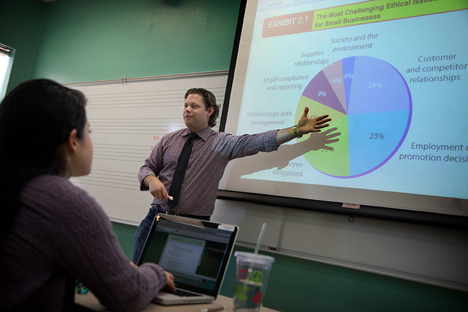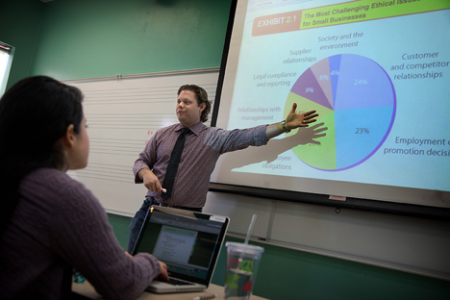Demanding creativity, ambition, artistic expertise and teamwork, the new class “Accelerating a Start-Up: Going from Idea to Implementation” (AMAE 4377) provides Southern Methodist University students the opportunity to “start a movement” of their very own, and makes its academic debut spring 2014.
Co-founder of the Dallas Entrepreneur Center (DEC) and current Meadows adjunct lecturer, Trey Bowles will use his professional experience as a Dallas start-up marketing strategist and entrepreneur to teach the course, which is scheduled to take place Tuesday and Thursday, from 12:30 to 1:50 p.m. Matching SMU students with DEC mentors, the new class goes beyond investigating important business concepts and topics, giving students unprecedented access to business leaders and expert mentors, and challenging students to seize the opportunity to turn their business ideas into reality.
While open to all SMU students, preference will be given to juniors and seniors, although first-years and sophomores can also apply. A panel composed of DEC co-founders Trey Bowles and Jeremy Vickers (a 2008 SMU M.B.A. graduate), Meadows Dean José Bowen and Meadows Director of Arts Entrepreneurship and Assistant Professor of Practice James Hart will choose students.
Once enrolled, students will form teams, with each team receiving a $5,000 grant to develop, expand and implement its ideas throughout the spring 2014 semester. While individuals are not required to apply or sign up for AMAE 4377 with a team or business, they must eventually join a team, and must be willing to be added to a team that needs more members. According to Bowles, the money awarded to each team comes from Meadows Dean José Bowen, and will be administered from the DEC at the beginning of the semester, as a grant; there will be no equity exchanged for the grant provided.
While each school at SMU has been invited to participate, and students of all majors and fields are encouraged to apply, Bowles recognizes that SMU Meadows School of the Arts was the first to contribute funding for the project. “Dean Bowen sees the incredible value in this program and we’re grateful for his support,” Bowles said.
When asked AMAE 4377, Meadows Dean José Bowen said, “Most artists run small businesses, but most art schools offer very little training in how to do this. As an artist myself I understand. I am often so busy creating (or being) the product that it is a struggle to find time to do the marketing, sales and contract negotiation. But you don’t get paid for practicing. This is a chance for students to develop a real business plan for a new arts business.”
“What makes the country’s top arts management and entrepreneurship universities different is not their curriculum or their content,” Bowles said, “but that they collaborate across the campus….and that is what the goal of AMAE 4377 is.” As co-founder of the Dallas Entrepreneur Center (DEC), and an active, experienced Dallas entrepreneur, Bowles underscores “how it takes all types of people to start a company,” and encourages all SMU students to investigate and take advantage of the opportunity AMAE 4377 presents. Under Bowles’ leadership and teaching, AMAE 4377 will both allow and challenge people with different skill sets from all over SMU campus to work together to form strong teams of competent people with complimentary talents necessary for success. Not only will AMAE 4377 facilitate the start-up process for SMU entrepreneurs, but it will drive team members to commit themselves to the development and implementation of a common, “team” idea or vision, fostering team collaboration, innovation and overall engagement.
As they engage in weekly reading and discussions, gain insight from pertinent guest lecturers and take advantage of everything DEC co-founders Bowles and Vickers have to offer, class members will grow in knowledge, connections and experience. According to the proposed class syllabus, mentor matching will take place early on in the semester, as Bowles said he works to “pull together mentors from across the north Texas region,” “leveraging all of the mentors…through the DEC.” A full list of current DC mentors includes area startup executives from organizations such as BuzzShift, Mark Cuban Companies and Microsoft.
“I was so excited to learn that SMU was offering the new AMAE 4377 course this spring,” Clara Lemon, a senior minoring in arts management and entrepreneurship at SMU, said. “It is something that not many other schools are offering for undergraduates, and we can learn invaluable skills, both as artists and as managers, when it comes to navigating the art world.”
Over the course of the semester, Bowles, Vickers and various select guest speakers will explore a wide range of important topics, delving into discussions centered on revenue models, online marketing and SEO, market research and customer validation, raising capital, branding, PR and building an online reputation, launching additional sales channels, turning an idea into a product or service, upselling and more. Thus, while students will grow in knowledge and understanding as individuals, they will simultaneously grow as teams, as DEC mentors coach, advise, counsel and provide feedback to the groups throughout the intense semester.
Applying and integrating all they learn, team members will collaborate with one another, flesh out ideas and concepts, brainstorm and, as they advance through the semester-long program, work together to develop and execute different milestones pertaining to their team idea. As the proposed syllabus details, the semester will culminate on the final day of class, when “each team will present to the class and a small group of investors and bankers for funding….[and] the class, faculty and investors will all judge and score the final presentations.”
While AMAE 4377 provides a semester-long crash-course on how to start a business, each team faces an additional opportunity after semester’s end, and must decide whether to further extend their business plans, free of charge, through a summer incubation program at the DEC in Dallas’s Design District.
“I am interested in knowing what type of exit strategies will be offered for students who choose to enter the DEC program, as some people are serial entrepreneurs or just lose interest in a business started in college,” Jehadu Abshiro, a sophomore minoring in arts management and entrepreneurship at SMU, said, when asked about what she would likely do if enrolled in the AMAE 4377 course this spring.
Expanding teams’ access to seasoned experts and business leaders in the North Texas area, the full incubation program promises office space, in-depth coaching, training, education and connection to at least one dedicated mentor.
“Most importantly,” Bowles says, “each team that takes the option of continuing through the DEC summer incubator will be held accountable to their plan and to their DEC mentor(s) in order to ensure success. They will be exposed to the startup community and have the option to speak with investors and entrepreneurial leaders, and learn from the existing entrepreneurs in the North Texas area.”
Regardless of teams’ decisions regarding the DEC summer incubation program, AMAE 4377 will, ideally, motivate students to develop their business full time after graduation, and facilitate the process involved in doing so.
AMAE 4377 requires interested undergraduates to submit a special online application at https://thedec.wufoo.com/forms/smu-accelerating-your-startup-application/, by Fri., Nov. 20, in order to be eligible for acceptance to and enrollment in the spring 2014 course. Students interested in enrolling in AMAE 4377 should contact their student advisors as soon as possible. For more information, contact the SMU’s Division of Arts Management and Entrepreneurship at 214-768-3425, or visit http://www.smu.edu/Meadows/AreasOfStudy/ArtsManagement, today.










